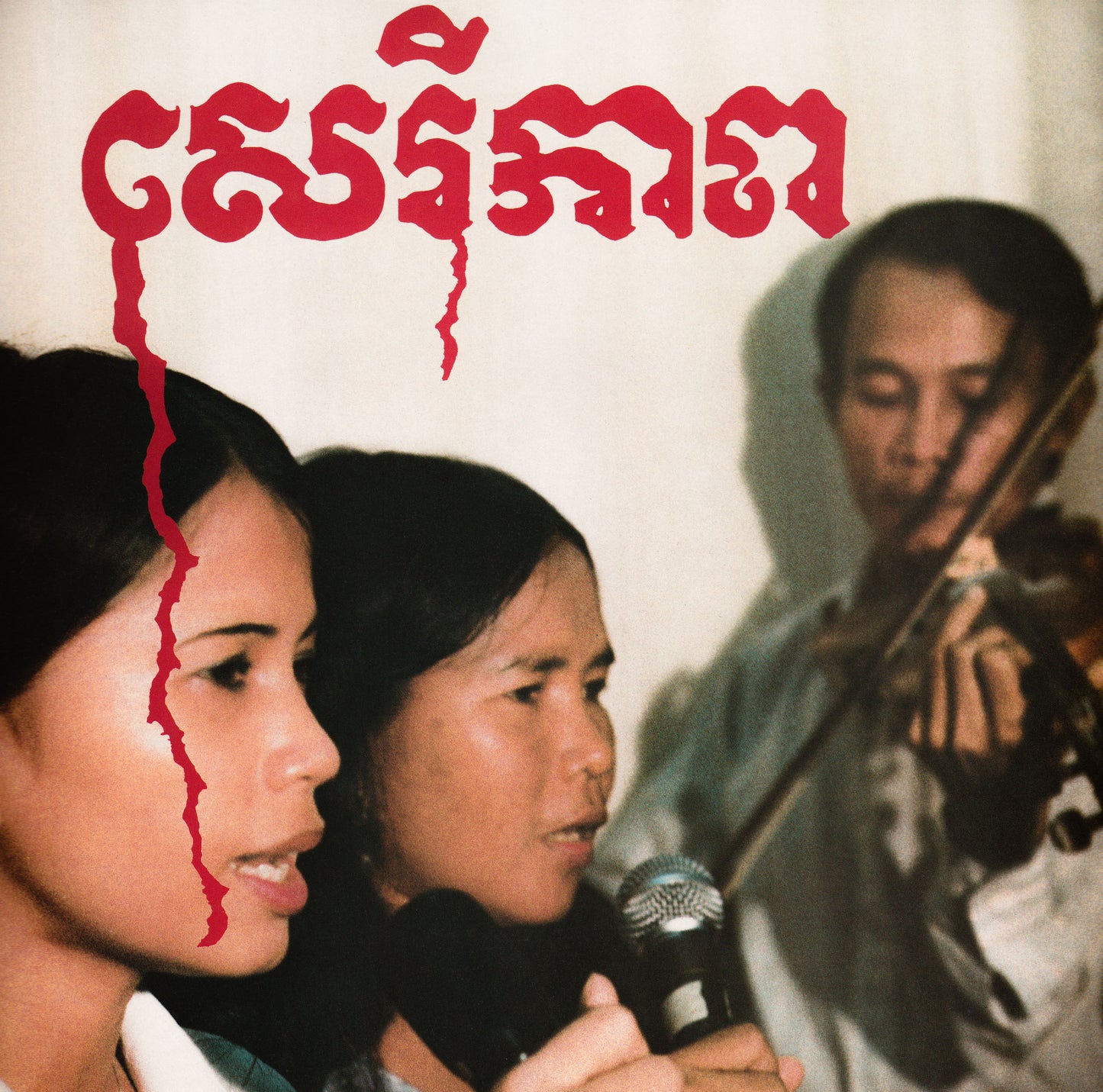1
/
of
1
Banteay Ampil Band 'Cambodian Liberation Songs'
Banteay Ampil Band 'Cambodian Liberation Songs'
Akuphone
Regular price
£10.99 GBP
Regular price
Sale price
£10.99 GBP
Unit price
/
per
Taxes included.
Couldn't load pickup availability
When I arrived at the Khmer-Thai border in September 1980, disorganized resistance cadres were busy repairing old guitar instrument by using shing line for guitar strings and employing a rusty, empty gasoline tank as a drum. They played old Khmer pop songs. [ ...]
They performed for themselves and for appreciative audiences of villagers. Other informal musical groups also came together to entertain themselves and others. One day in 1981, I photographed what was generally called the Bamteay Ampil Band.' Gaffar Peang-Meth, November 2016 Cambodian Liberation Songs is a painful call from forgotten resistance fighters.
It is a captivating record, a touching testimony of Cambodian history that brings to the world the breathless voice of these resistance members from the Banteay Ampil Band.
Released in 1983, Cambodian Liberation Songs is a mysterious and overwhelming record. As a genuine piece of history, this 'eloquent sadness and fierce passion' runs the gamut of Cambodian music, from folk to rock, expressing their suffering and pain.
On 17 April 1975, the Cambodian people, already crushed under national and international conflicts, was commanded by force to forget their own past; it was Year 0 of the Khmer Rouge calendar. Almost four years of genocide would follow before the start of a war between the Vietnamese army and the Khmer Rouge. Resistance units engaged in the conflict against what they considered a Vietnamese invasion. This record, produced by a resistance group, was given the reference number KHMER 001.
It was undoubtedly the first record composed and performed by non-Khmer Rouge Cambodians after the tragic events of 1975-79. The refugee camp of Ampil, near the Thai border, witnessed the creation of the Banteay Ampil Band. Musicians and female singers who had hidden their talents during the genocide, gathered around the composer and violinist Oum Dara to engage in a new struggle: the resistance. Oum Dara, who had been a composer for Sinn Sisamouth and Ros Serey Sothea among others, adapted several of his creations. It is therefore, with a poignant charm, that the Banteay Ampil Band binds together the golden age of Khmer music from the 1960s with the traditional repertoire and the context of their daily struggles.
Violin, guitar and voices work together to produce melancholic and intense songs - the stirring tone of grief expressed by these resistant fighters. The band went to Singapore to record Cambodian Liberation Songs, the only record of the 'Khmer People's National Liberation Front'.
Tracklisting:
1. My Last Words
2. Please Take Care Of My Mother
3. Tuol Tneung The Hillock Of The Vine
4. Don T Forget Khmer Blood
5. Sereika Armed Forces
6. Follow The Front
7. I M Waiting For You
8. Please Avenge My Blood Darling
9. Destroy The Communist Viet
10. Look At The Sky
11. Vietnamese Sparrows
12. The Vietnamese Have Invaded Our Country
They performed for themselves and for appreciative audiences of villagers. Other informal musical groups also came together to entertain themselves and others. One day in 1981, I photographed what was generally called the Bamteay Ampil Band.' Gaffar Peang-Meth, November 2016 Cambodian Liberation Songs is a painful call from forgotten resistance fighters.
It is a captivating record, a touching testimony of Cambodian history that brings to the world the breathless voice of these resistance members from the Banteay Ampil Band.
Released in 1983, Cambodian Liberation Songs is a mysterious and overwhelming record. As a genuine piece of history, this 'eloquent sadness and fierce passion' runs the gamut of Cambodian music, from folk to rock, expressing their suffering and pain.
On 17 April 1975, the Cambodian people, already crushed under national and international conflicts, was commanded by force to forget their own past; it was Year 0 of the Khmer Rouge calendar. Almost four years of genocide would follow before the start of a war between the Vietnamese army and the Khmer Rouge. Resistance units engaged in the conflict against what they considered a Vietnamese invasion. This record, produced by a resistance group, was given the reference number KHMER 001.
It was undoubtedly the first record composed and performed by non-Khmer Rouge Cambodians after the tragic events of 1975-79. The refugee camp of Ampil, near the Thai border, witnessed the creation of the Banteay Ampil Band. Musicians and female singers who had hidden their talents during the genocide, gathered around the composer and violinist Oum Dara to engage in a new struggle: the resistance. Oum Dara, who had been a composer for Sinn Sisamouth and Ros Serey Sothea among others, adapted several of his creations. It is therefore, with a poignant charm, that the Banteay Ampil Band binds together the golden age of Khmer music from the 1960s with the traditional repertoire and the context of their daily struggles.
Violin, guitar and voices work together to produce melancholic and intense songs - the stirring tone of grief expressed by these resistant fighters. The band went to Singapore to record Cambodian Liberation Songs, the only record of the 'Khmer People's National Liberation Front'.
Tracklisting:
1. My Last Words
2. Please Take Care Of My Mother
3. Tuol Tneung The Hillock Of The Vine
4. Don T Forget Khmer Blood
5. Sereika Armed Forces
6. Follow The Front
7. I M Waiting For You
8. Please Avenge My Blood Darling
9. Destroy The Communist Viet
10. Look At The Sky
11. Vietnamese Sparrows
12. The Vietnamese Have Invaded Our Country
Share


